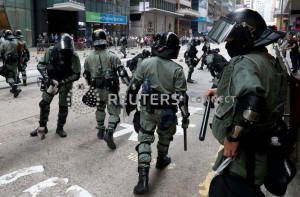Hong Kong students hunker down as government dismisses curfew rumors
 Send a link to a friend
Send a link to a friend
 [November 14, 2019]
By Kate Lamb and Jessie Pang [November 14, 2019]
By Kate Lamb and Jessie Pang
HONG KONG (Reuters) - Pro-democracy
protesters paralyzed parts of Hong Kong for a fourth day on Thursday,
forcing schools to close and blocking highways, as students built campus
barricades and stockpiled weapons and the government dismissed rumors of
a curfew.
Thousands of students hunkered down on several campuses, surrounded by
piles of food, bricks, petrol bombs, arrows with heads wrapped in
cladding, catapults and other homemade weapons.
Police said the Chinese University, in the New Territories, had become a
"weapons factory and an arsenal" with bows and arrows and catapults.
"Their acts are another step closer to terrorism," Chief Superintendent
(Public Relations) Tse Chun-chung told a briefing, referring to protests
on all campuses.
He also said police would temporarily avoid directly clashing with
"high-spirited rioters" to give themselves a breather and avoid
injuries.

China's Global Times tabloid, owned by the state-run People's Daily, the
mouthpiece of the Communist Party, said on Twitter that the Hong Kong
government was expected to announce a weekend curfew after some of the
worst violence in decades in the Chinese-ruled city.
It deleted the post after a short time. The Hong Kong government said
the rumors were "totally unfounded".
Protesters have torched vehicles and buildings, hurled petrol bombs at
police stations and trains, dropped debris from bridges on to traffic
below and vandalized shopping malls and campuses, raising questions
about how and when more than five months of unrest can be brought to an
end.
Police said arrows were fired at officers from Hong Kong Polytechnic
University in the morning.
Several universities announced there would be no classes on campuses for
the rest of the year.
Baptist University, next to a People's Liberation Army base in Kowloon
Tong, issued an "urgent appeal", telling students to stay away from
campus.
"Your safety is so dear to our hearts and to your parents' and friends’
hearts," it said. "Please stay away from harm’s way."
PETROL BOMBS AND BRICKS
Hundreds of protesters occupied roads in the city's business district,
home to some of the world's most expensive real estate, in the middle of
the day.
Across the harbor, black-clad protesters and students maintained their
blockades of major roads, including the entrance to the Cross-Harbour
Tunnel that links Hong Kong island to the Kowloon area, and a highway
between Kowloon and the rural New Territories.
[to top of second column]
|

Riot police officers remove bricks from a street, left by
anti-government demonstrators, in Central, Hong Kong, China November
14, 2019. REUTERS/Athit Perawongmetha

Police fired tear gas near the tunnel early on Thursday to try to
clear the protesters. Roads were strewn with bricks and other
debris, causing widespread traffic jams.
At the Polytechnic University, near the Kowloon entrance of the
Cross Harbour tunnel, hundreds of students wearing gas masks readied
for confrontation. They were practising throwing petrol bombs and
archery in a half-empty swimming pool.
Boxes of petrol bombs were placed at vantage points overlooking
roads, including the tunnel, which has been blocked since Wednesday
evening.
Violence has escalated in recent days, with police shooting and
wounding one protester at close range and one man described as a
"rioter" dousing a man with petrol before setting him on fire.
The man who was shot was in stable condition. The man who was lit on
fire suffered burns to his torso and head, and was in critical
condition.
There was also a tense standoff between chanting protesters and
police in the New Territories town of Sheung Shui.
The demonstrations were spurred by what many residents see as the
stifling by Beijing of freedoms guaranteed under the "one country,
two systems" formula put in place when the former British colony
returned to Chinese rule in 1997.
Anger grew over perceived police brutality as the protests
intensified. Police deny being heavy handed and say they have shown
restraint in the face of potentially deadly attacks.

Police said they would appoint 100 Correctional Services Department
staff, who look after prisons, to reinforce the streets.
“I cannot see how adding 100 special police will help much,"
democratic lawmaker Tanya Chan told Reuters. "I don't know why the
government doesn't adopt measures that can soften the tension rather
than intensify conflict.”
China denies interfering in Hong Kong and has blamed Western
countries, including Britain and the United States, for stirring up
trouble.
(Reporting by Sarah Wu, Kate Lamb, Jessie Pang, Donny Kwok, Twinnie
Siu, Anne Marie Roantree, Clare Jim and Felix Tam; Writing by Farah
Master and Nick Macfie; Editing by Gerry Doyle, Robert Birsel)
[© 2019 Thomson Reuters. All rights
reserved.]
Copyright 2019 Reuters. All rights reserved. This material may not be published,
broadcast, rewritten or redistributed.
Thompson Reuters is solely responsible for this content. |